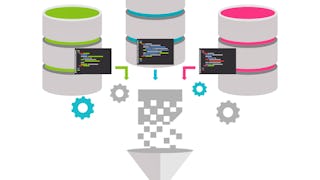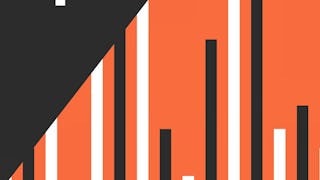- Browse
- Kafka
Kafka Courses
Kafka courses can help you learn data streaming, event-driven architecture, and message brokering. You can build skills in managing real-time data feeds, ensuring data integrity, and optimizing system performance. Many courses introduce tools like Apache Kafka, Confluent, and Kafka Streams, that support building scalable applications and integrating data across various platforms.
Popular Kafka Courses and Certifications
 Status: Free TrialFree TrialL
Status: Free TrialFree TrialLLearnKartS
Skills you'll gain: Apache Kafka
3.9·Rating, 3.9 out of 5 stars47 reviewsBeginner · Specialization · 1 - 3 Months
 Status: Free TrialFree Trial
Status: Free TrialFree TrialSkills you'll gain: Extract, Transform, Load, Apache Airflow, Data Pipelines, Apache Kafka, Data Warehousing, Data Transformation, Data Migration, Web Scraping, Data Integration, Shell Script, Data Processing, Data Mart, Unix Shell, Big Data, Performance Tuning, Scalability
4.5·Rating, 4.5 out of 5 stars444 reviewsIntermediate · Course · 1 - 3 Months
 Status: NewNewStatus: Free TrialFree Trial
Status: NewNewStatus: Free TrialFree TrialSkills you'll gain: Apache Kafka, Data Transformation, Real Time Data, Fraud detection, Data Pipelines, Data Manipulation, Apache Spark, PySpark, Performance Tuning, Grafana, Disaster Recovery, Data Architecture, Prometheus (Software), Data Integrity, Data Processing, Data Governance, Scalability, Event-Driven Programming, System Monitoring, Docker (Software)
Intermediate · Specialization · 3 - 6 Months
 Status: Free TrialFree TrialL
Status: Free TrialFree TrialLLearnKartS
Skills you'll gain: Apache Kafka, Server Administration
4·Rating, 4 out of 5 stars39 reviewsIntermediate · Course · 1 - 4 Weeks
 Status: Free TrialFree Trial
Status: Free TrialFree TrialSkills you'll gain: Apache Kafka, Command-Line Interface, Apache, Data Pipelines, Java, Enterprise Application Management, Real Time Data, Distributed Computing, Performance Tuning
4.5·Rating, 4.5 out of 5 stars11 reviewsIntermediate · Course · 3 - 6 Months
 Status: NewNewStatus: Free TrialFree Trial
Status: NewNewStatus: Free TrialFree TrialSkills you'll gain: Apache Kafka, Data Warehousing, Extract, Transform, Load, Microsoft SQL Servers, Snowflake Schema, Star Schema, Performance Tuning, Data Pipelines, Cloud Computing Architecture, Business Intelligence, Real Time Data, Apache Hadoop, Data Modeling, Data Quality, Responsible AI, Apache Spark, SQL, Generative AI, Data Governance, Quality Management
4.3·Rating, 4.3 out of 5 stars87 reviewsIntermediate · Specialization · 1 - 3 Months
What brings you to Coursera today?
 Status: Free TrialFree TrialL
Status: Free TrialFree TrialLLearnKartS
Skills you'll gain: Microservices, Network Monitoring
4.2·Rating, 4.2 out of 5 stars9 reviewsIntermediate · Course · 1 - 4 Weeks
 Status: Free TrialFree TrialC
Status: Free TrialFree TrialCCoursera
Skills you'll gain: Apache Kafka, Real Time Data, Data Pipelines, Data Processing, Scalability, Performance Tuning
3.5·Rating, 3.5 out of 5 stars11 reviewsBeginner · Course · 1 - 4 Weeks
 Status: Free TrialFree Trial
Status: Free TrialFree TrialSkills you'll gain: NoSQL, Data Warehousing, SQL, Apache Hadoop, Extract, Transform, Load, Apache Airflow, Data Security, Linux Commands, Data Migration, Database Design, Data Governance, MySQL, Database Administration, Apache Spark, Data Pipelines, Apache Kafka, Database Management, Bash (Scripting Language), Data Architecture, Data Store
4.6·Rating, 4.6 out of 5 stars7.3K reviewsBeginner · Professional Certificate · 3 - 6 Months
 G
GGoogle Cloud
Skills you'll gain: Apache Kafka, Data Pipelines, Google Cloud Platform, Java, Public Cloud, Cloud API, Network Analysis
3.8·Rating, 3.8 out of 5 stars27 reviewsBeginner · Project · Less Than 2 Hours
 Status: Free TrialFree TrialR
Status: Free TrialFree TrialRRice University
Skills you'll gain: Apache Kafka, Apache Spark, Apache Hadoop, Distributed Computing, Dataflow, Java Programming, Java, Software Architecture, Systems Architecture, Scala Programming, Data Structures, System Programming, Programming Principles, Servers, Application Frameworks, Debugging, Algorithms, Performance Tuning, Functional Design, Performance Testing
4.6·Rating, 4.6 out of 5 stars1.6K reviewsIntermediate · Specialization · 3 - 6 Months

Skills you'll gain: Apache Kafka, Spring Boot, Real Time Data, Java, Unit Testing, Restful API, JSON, Integration Testing, Data Transformation, Scalability, Debugging
Intermediate · Course · 3 - 6 Months
Searches related to kafka
In summary, here are 10 of our most popular kafka courses
- Apache Kafka: LearnKartS
- ETL and Data Pipelines with Shell, Airflow and Kafka: IBM
- Real-Time, Real Fast: Kafka & Spark for Data Engineers: Coursera
- Kafka Fundamentals: LearnKartS
- Apache Kafka Series - Learn Apache Kafka for Beginners v3: Packt
- Building Smarter Data Pipelines: SQL, Spark, Kafka & GenAI: Coursera
- Kafka Architecture and Internals: LearnKartS
- Apache Kafka - An Introduction: Coursera
- IBM Data Architecture: IBM
- Creating a Streaming Data Pipeline With Apache Kafka: Google Cloud
Frequently Asked Questions about Kafka
Kafka is an open-source stream processing platform developed by the Apache Software Foundation. It is designed to handle real-time data feeds with high throughput and low latency. Kafka is important because it allows organizations to process and analyze large volumes of data in real-time, making it essential for applications that require immediate insights, such as monitoring, analytics, and event-driven architectures. Its ability to integrate with various data sources and systems makes it a versatile tool in modern data ecosystems.
With skills in Kafka, you can pursue various job roles in the tech industry. Common positions include Data Engineer, Software Engineer, and DevOps Engineer. These roles often involve building and maintaining data pipelines, developing applications that utilize real-time data, and ensuring the reliability and scalability of data systems. Additionally, roles such as Data Analyst and Business Intelligence Developer may also benefit from a strong understanding of Kafka, as it plays a crucial role in data ingestion and processing.
To effectively learn Kafka, you should focus on several key skills. First, a solid understanding of programming languages such as Java or Scala is essential, as Kafka is often used in conjunction with these languages. Familiarity with distributed systems and concepts like message queues and stream processing is also important. Additionally, knowledge of data serialization formats (like Avro or JSON) and experience with cloud platforms can enhance your ability to work with Kafka in various environments.
There are several online courses available to help you learn Kafka. Notable options include the Apache Kafka Specialization, which provides a comprehensive overview of Kafka's features and applications. Another great choice is Apache Kafka - An Introduction, ideal for beginners looking to understand the basics. For those interested in more advanced topics, the Kafka Architecture and Internals course dives deeper into Kafka's underlying mechanisms.
Yes. You can start learning kafka on Coursera for free in two ways:
- Preview the first module of many kafka courses at no cost. This includes video lessons, readings, graded assignments, and Coursera Coach (where available).
- Start a 7-day free trial for Specializations or Coursera Plus. This gives you full access to all course content across eligible programs within the timeframe of your trial.
If you want to keep learning, earn a certificate in kafka, or unlock full course access after the preview or trial, you can upgrade or apply for financial aid.
To learn Kafka effectively, start by familiarizing yourself with its core concepts and architecture. You can begin with introductory courses that cover the basics. Hands-on practice is crucial, so consider setting up a local Kafka environment to experiment with producing and consuming messages. Additionally, working on real-world projects or contributing to open-source initiatives can provide practical experience. Engaging with the community through forums and discussion groups can also enhance your learning journey.
Typical topics covered in Kafka courses include the architecture of Kafka, message production and consumption, data serialization, and stream processing. Courses often explore integration with other technologies, such as Spark and Flume, and explore into monitoring and managing Kafka clusters. Security aspects, including authentication and authorization, are also commonly addressed, ensuring learners understand how to implement Kafka in a secure environment.
For training and upskilling employees, the Building Smarter Data Pipelines: SQL, Spark, Kafka & GenAI Specialization is an excellent choice. This specialization covers not only Kafka but also how it integrates with other data technologies, making it suitable for teams looking to enhance their data processing capabilities. Additionally, courses focused on specific use cases, such as Kafka Integration with Storm, Spark, Flume, and Security, can provide targeted training for employees working in data-intensive environments.










